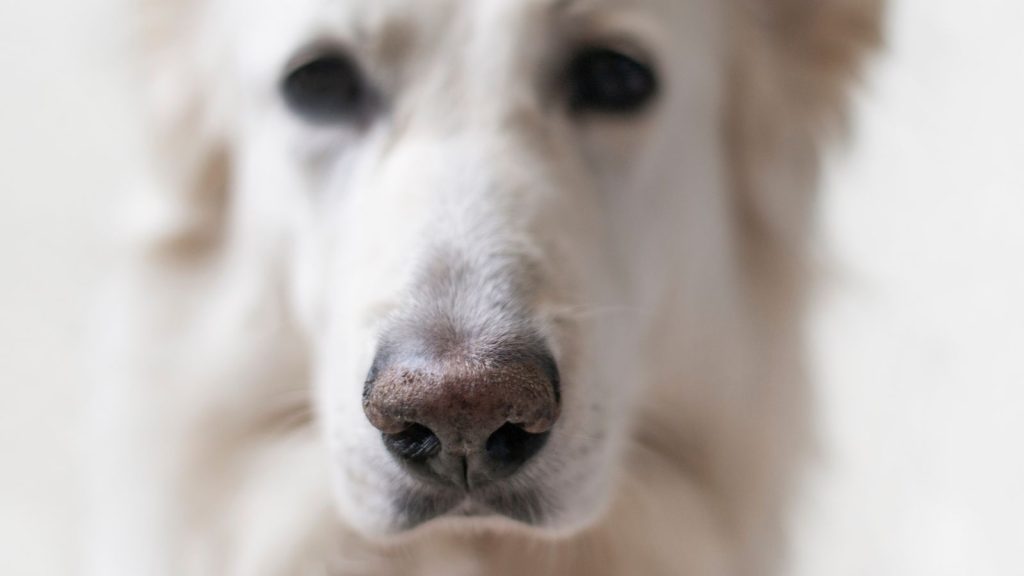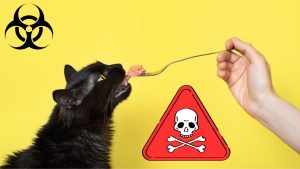If you’ve ever noticed that your dog’s nose is dry, you might be wondering if it’s a cause for concern. While a dry nose in dogs can be a sign of dehydration or illness, it’s not always a cause for alarm. In fact, there are many reasons why a dog’s nose might be dry, and some of them are perfectly normal.
Understanding why your dog’s nose is dry and what you can do to help can help you keep your furry friend healthy and happy. In this article, we’ll take a closer look at the role of a dog’s nose, the causes of dry nose in dogs, and what you can do to treat and prevent it. Whether you’re a new dog owner or you’ve had dogs for years, this guide will provide you with the information you need to keep your pet’s nose healthy and moist.
Key Takeaways
- A dry nose in dogs can be a sign of dehydration or illness, but it’s not always a cause for alarm.
- Understanding the role of a dog’s nose and the causes of dry nose can help you keep your pet healthy.
- Treatment and prevention strategies can help keep your dog’s nose moist and healthy.
Understanding Dog’s Nose
Your dog’s nose is an incredibly important part of their anatomy. It is not only a tool for smelling, but it also helps them regulate their body temperature and moisture levels. A dog’s nose has a unique structure that allows them to pick up scent particles in the air.
Dogs have olfactory glands in their noses that are responsible for their sense of smell. These glands are much larger in dogs than in humans, which is why dogs have a much stronger sense of smell. In fact, dogs can detect scents that are 10,000 to 100,000 times weaker than what humans can detect.
When it comes to a dog’s nose, it is normal for it to be wet. A wet nose helps dogs pick up scent particles more easily. However, it is important to note that a warm, dry nose is not always a sign of illness. In fact, a dog’s nose can change from wet to dry throughout the day, depending on their activity level and environment.
Dogs also have a special organ in their nose called the Jacobson’s organ, which is responsible for detecting pheromones. This organ allows dogs to communicate with each other through scent. When a dog sniffs another dog’s urine or feces, they are using their Jacobson’s organ to gather information about that dog.
In summary, a dog’s nose is a complex and important part of their anatomy. It is normal for a dog’s nose to be wet, but a warm, dry nose is not always a sign of illness. Dogs have olfactory glands and a Jacobson’s organ that allow them to pick up scent particles and communicate with each other through scent.
The Role of Age and Breed
Your dog’s age and breed can play a significant role in the dryness of their nose. As dogs age, their body undergoes various changes, including the development of a dry nose. So, if you have an older dog, it’s not uncommon for them to have a dry nose.
Certain breeds of dogs are also more prone to having dry noses. Brachycephalic breeds, such as pugs and bulldogs, have a shorter snout, which can make it difficult for them to breathe and regulate their body temperature. This can lead to dehydration, which can cause their nose to become dry.
Senior dogs, especially those with underlying health conditions, are also more likely to have a dry nose. If your dog is a senior, it’s essential to keep an eye on their nose and overall health to ensure they’re not dehydrated.
While age and breed can contribute to a dry nose, it’s essential to rule out any underlying health conditions. If your dog’s nose is consistently dry, it’s best to consult with your veterinarian to determine the root cause and appropriate treatment.
In summary, the age and breed of your dog can contribute to a dry nose. Brachycephalic breeds, senior dogs, and older dogs are more prone to having a dry nose. However, it’s crucial to rule out any underlying health conditions and seek veterinary care if necessary.
Causes of Dry Nose in Dogs
If you’ve noticed that your dog’s nose is dry, it could be due to a number of reasons. Here are some of the common causes of dry nose in dogs:
Dehydration
Dehydration is one of the most common causes of dry nose in dogs. If your dog is not drinking enough water or is losing more fluids than they are taking in, they can become dehydrated. This can lead to a dry nose, among other symptoms.
Exposure to the Elements
Exposure to the elements, such as hot sunlight, wind, or cold weather, can dry out your dog’s nose. This is because these conditions can cause the moisture in your dog’s nose to evaporate, leaving it dry.
Allergies
Allergies can also cause a dry nose in dogs. If your dog is allergic to certain allergens, such as pollen or household products, their nose may become dry and irritated as a result of the allergic reaction.
Sleeping
When your dog is asleep, they stop licking their nose. This can cause their nose to dry out temporarily. However, this is normal and not a cause for concern.
Medications
Some medications can cause a dry nose in dogs. For example, certain drugs used to treat allergies or other medical conditions can cause dryness in the nasal passages.
Plastic and Other Household Products
Exposure to plastic or other household products can also cause a dry nose in dogs. This is because these materials can irritate the nasal passages and cause them to dry out.
Overall, there are many potential causes of dry nose in dogs, ranging from dehydration to exposure to the elements. If you’re concerned about your dog’s dry nose, it’s important to consult with your veterinarian to determine the underlying cause and develop an appropriate treatment plan.
Health Implications of a Dry Nose
A dry nose in dogs can indicate a variety of health issues. It is essential to monitor your dog’s nose and seek veterinary attention if it is persistently dry or cracked. Here are some potential health implications of a dry nose:
-
Dehydration: A dry nose can be a sign of dehydration. Make sure your dog has access to clean water at all times.
-
Nasal Cavity Issues: Dryness in the nasal cavity can be caused by a variety of issues such as nasal hyperkeratosis, autoimmune diseases, and blocked tear ducts. These conditions can cause discomfort and difficulty breathing.
-
Canine Distemper: Canine distemper is a viral disease that can cause dryness in the nose, along with other symptoms such as lethargy, vomiting, diarrhea, changes in appetite, coughing, and runny nose. It is essential to vaccinate your dog against this disease.
-
Dry Eye: Dry eye, also known as keratoconjunctivitis sicca, can cause dryness in the nose and eyes. It occurs when the tear ducts do not produce enough tears to keep the eyes and nose moist.
If you notice any of these symptoms, it is crucial to seek veterinary attention. Your vet may perform a biopsy or other tests to diagnose the underlying condition. Treatment may include medication, surgery, or changes in diet.
Remember that a dry nose can be a sign of a more severe underlying condition. Regular check-ups with your veterinarian can help catch any issues early on.
Treatment and Prevention
If your dog’s nose is dry, there are several things you can do to help. Here are some tips:
Provide Fresh Water
Make sure your dog has access to clean, fresh water at all times. Dehydration can cause a dry nose, so it’s important to keep your dog well-hydrated.
Use a Moisturizer
Consider using a moisturizer specifically designed for dogs’ noses. There are several products available, such as nose balms, petroleum jelly, coconut oil, shea butter, and olive oil. Apply a small amount to your dog’s nose several times a day to help keep it moisturized.
Protect from the Sun
If your dog spends a lot of time outside, it’s important to protect their nose from the sun. Use a pet-safe sunscreen or consider using a moisturizer that contains SPF.
Prescription Lotion
For more severe cases of dry nose, your veterinarian may prescribe a lotion specifically designed to hydrate and nourish the skin on your dog’s nose. These lotions are safe for ingestion, as dogs often lick their noses.
Address Underlying Health Issues
If your dog’s dry nose is accompanied by other symptoms, such as sneezing, coughing, or discharge, it could be a sign of an underlying health issue. Schedule an appointment with your veterinarian to rule out any medical conditions.
Avoid Stainless Steel Bowls
Some dogs may be sensitive to stainless steel bowls, which can cause irritation and dryness on their noses. Consider using a ceramic or plastic water bowl instead.
By following these tips, you can help prevent and treat your dog’s dry nose. Remember to always consult with your veterinarian before trying any new treatments or medications.
Frequently Asked Questions
Can a dry nose be a sign of dehydration in dogs?
Yes, a dry nose can be a sign of dehydration in dogs. However, it is not always the case. Other symptoms of dehydration include lethargy, loss of appetite, sunken eyes, and dry mouth. If you suspect your dog is dehydrated, it is important to seek veterinary care immediately.
What are some common causes of a dry nose in dogs?
Some common causes of a dry nose in dogs include dry weather, dehydration, allergies, sunburn, and certain medical conditions. Nasal hyperkeratosis, a condition where the nose becomes dry and crusty, is also a common cause of a dry nose in dogs.
How can I moisturize my dog’s dry nose?
You can moisturize your dog’s dry nose by applying a small amount of petroleum jelly or coconut oil to the nose. You can also use a commercial dog nose balm or moisturizer. It is important to avoid using products that contain fragrances or other irritants.
Is it safe to use Vaseline on my dog’s dry nose?
Yes, it is safe to use Vaseline on your dog’s dry nose. However, it is important to use a small amount and avoid getting the product in your dog’s eyes or mouth.
What are some natural remedies for a dog’s dry nose?
Some natural remedies for a dog’s dry nose include applying a small amount of coconut oil, using a humidifier in your home, and providing your dog with plenty of fresh water. It is important to consult with your veterinarian before using any natural remedies.
When should I be concerned about my dog’s dry nose?
You should be concerned about your dog’s dry nose if it is accompanied by other symptoms, such as lethargy, loss of appetite, or difficulty breathing. It is also important to seek veterinary care if your dog’s dry nose is caused by a medical condition, such as nasal hyperkeratosis.
Yes, a dry nose can be a sign of dehydration in dogs. However, it is not always the case. Other symptoms of dehydration include lethargy, loss of appetite, sunken eyes, and dry mouth. If you suspect your dog is dehydrated, it is important to seek veterinary care immediately.
“}},{“@type”:”Question”,”name”:”What are some common causes of a dry nose in dogs?”,”acceptedAnswer”:{“@type”:”Answer”,”text”:”
Some common causes of a dry nose in dogs include dry weather, dehydration, allergies, sunburn, and certain medical conditions. Nasal hyperkeratosis, a condition where the nose becomes dry and crusty, is also a common cause of a dry nose in dogs.
“}},{“@type”:”Question”,”name”:”How can I moisturize my dog’s dry nose?”,”acceptedAnswer”:{“@type”:”Answer”,”text”:”
You can moisturize your dog’s dry nose by applying a small amount of petroleum jelly or coconut oil to the nose. You can also use a commercial dog nose balm or moisturizer. It is important to avoid using products that contain fragrances or other irritants.
“}},{“@type”:”Question”,”name”:”Is it safe to use Vaseline on my dog’s dry nose?”,”acceptedAnswer”:{“@type”:”Answer”,”text”:”
Yes, it is safe to use Vaseline on your dog’s dry nose. However, it is important to use a small amount and avoid getting the product in your dog’s eyes or mouth.
“}},{“@type”:”Question”,”name”:”What are some natural remedies for a dog’s dry nose?”,”acceptedAnswer”:{“@type”:”Answer”,”text”:”
Some natural remedies for a dog’s dry nose include applying a small amount of coconut oil, using a humidifier in your home, and providing your dog with plenty of fresh water. It is important to consult with your veterinarian before using any natural remedies.
“}},{“@type”:”Question”,”name”:”When should I be concerned about my dog’s dry nose?”,”acceptedAnswer”:{“@type”:”Answer”,”text”:”
You should be concerned about your dog’s dry nose if it is accompanied by other symptoms, such as lethargy, loss of appetite, or difficulty breathing. It is also important to seek veterinary care if your dog’s dry nose is caused by a medical condition, such as nasal hyperkeratosis.
“}}]}
Author
-

Lawrence, the founder of Pet Ploy, established the website in mid-2023. With a lifelong love for pets, Lawrence has been surrounded by a variety of animals since his early years. From dogs and cats to guinea pigs, rabbits, fish, and more, he has experienced the joy of caring for a diverse range of pets. Drawing from his deep-rooted passion, Lawrence created Pet Ploy to share his knowledge and enthusiasm with fellow pet enthusiasts. Through the platform, he aims to provide valuable insights, tips, and resources to promote the well-being and happiness of pets everywhere.











